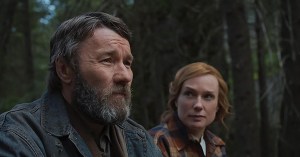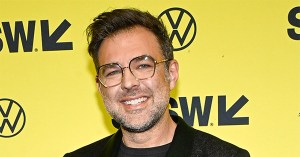Robin Wright Has An Idea for A Movie About Wonder Woman‘s Amazons, And She Would “Jump At” the Chance To Do It
As she makes her feature directing debut with the moving and visually striking Land, Wright talks film-making inspirations, connecting with Demián Bichir, and, yes, a nifty idea for the DC team.

(Photo by Daniel Power / Focus Features)
Actress Robin Wright makes her feature directing debut this February with Land, the moving and extraordinarily scenic story of a woman who goes off grid to disconnect from society and reconnect with nature and herself after a tragedy almost breaks her. Testing herself against the elements, isolation, and at one point a very curious (and hungry) bear, she once again finds herself at a breaking point – until a stranger, played by Oscar-nominee Demián Bichir, stumbles into her life and the two begin to put the pieces back together.
Talking to Rotten Tomatoes shortly after the film debuted at the 2021 Sundance Film Festival, Wright – who directed 10 episodes of House of Cards during her time on the show – says she drew inspiration from a number of the directors she’s worked with across her career, an enviable roster of big names and auteurs that ranges from Zack Snyder to Anthony Minghella. In fact, over the years she would write down the things she liked about their directing style for safe keeping – “beautiful gifts that you’re given from other directors,” she says.
Critics have so far lauded Wright’s assuredness behind the camera and a typically commanding performance in front of it, and noted that the film – shot largely on 8,000-foot Moose Mountain in Calgary, where the crew was whipped around by rapidly changing, dramatic conditions – is a visual treat. As she prepares to share Land with the world, Wright talked with us about why this was the right project to kick start her feature directing career, discovering the talent and friendship of Bichir, and the possibility of an all-Amazon, all-Themyscira-set Wonder Woman movie. (Spoiler: She’s into it.)
Joel Meares for Rotten Tomatoes: I read that you’ve had a lot of projects come across your desk over the years as potential first features for you to direct. What was it about Land and this story that spoke to you and made you say, “This is the one I want to do”?
Robin Wright: It fell into my lap about two-and-a-half, three years ago, when we were all experiencing random shootings that were happening almost biweekly. And I was just thinking about the amount of loss and grief and tragedy that was going on in our world. Then to have this last year that we’ve all been suffering, enduring… This movie just resonated with me because, yes, it’s about a woman’s journey through her grief, this unfathomable event that happens to her life and changes her life forever, and she goes to live off the grid, but in the end, it’s just a beautiful stranger, human kindness, that allows human resilience in Edee and a renewed sense of hope and faith. So, you get to the end of this film and it was just so uplifting to me. I felt like that was a message we needed out there right now: That we can get through and we do need the help of others. We do need human connection.

(Photo by Daniel Power / Focus Features)
The film looked like it would have been challenging to shoot, just the physicality of it, the locations, the weather. What was it like shooting on Moose Mountain, up there in Calgary?
Wright: It was incredible and difficult because the unpredictable weather patterns there, they’re wicked. We were prepared by the Calgary film crew [who told us] you have no idea what it can become, and we experienced all of that. We had 29 days to shoot the movie, and we didn’t think we were ever going to get snow because we were shooting from part of September through part of October. And we got four seasons in 29 days. It was pure luck because they had never experienced having four feet of snow at the end of September.
That luck obviously worked for the film because you’ve got this beautiful and varying imagery – and plenty of snow. But I was watching the moment where Edee breaks down on the floor and says, “This isn’t working,” and I wondered, with the wild conditions and the short shoot, if you had any “this isn’t working” moments as a director?
Wright: No, but I think I was probably sometimes going to an emotion as an actor that’s going, “This isn’t working. This take isn’t working!” I think I was using that one instead.

(Photo by Daniel Power / Focus Features)
So you never wanted to hit the floor and scream, “Damn, this weather!”
Wright: No, gosh, no, no. Really we thanked the weather gods because while they were dangerous sometimes, the winds – we’d have to shut down for a portion of the day and everybody had to get off that part of the mountain because the winds were too strong – those kinds of things were definitely things you prepared for. And then you had to be prepared to potentially lose a scene that you wanted in the movie because you just didn’t have time to shoot it because the weather took you elsewhere.
In House of Cards and here you directed yourself, and oftentimes in this film you’re the only person in the scene. What are the challenges of directing yourself when the focus is so squarely on you?
Wright: It’s a job we do. What it entails, being in front of the camera and behind the camera, is that you don’t have to describe [what needs to happen], you don’t have to express verbally, “This is what I want to achieve in a scene,” or “If you could do this take in this way.” You already have it in your head. I already knew who this character was. We’d been developing the script for over a year and talking about the character and the dynamic between Edee and Miguel – what that should be. So, you’re already immersed in it. You don’t really have to talk about it so much. You just do it.

(Photo by David Giesbrecht / ©Netflix / courtesy Everett Collection)
Wright: Multiple, I would say. You find that little nugget that you love that that director did – I love this style, the way that director shot that scene. And I would just take notes over the course of my years as an actor. And I saved those notes: I really loved this, that Anthony Minghella did; I loved what David Fincher did with Season 1 of House of Cards… You just kind of compile all those things and then you find your own style. But yes, for sure, they’re beautiful gifts that you’re given from other directors, just watching their originality.
Your primary co-star in this film is Demián Bichir, and it’s a beautiful performance and a lovely dynamic and great chemistry between the two of you. How did you land on Demián for the role of Miguel?
Wright: I had never heard of him. And when this role called for a Hispanic man, you’re given a couple of people on a list, and I watched him in A Better Life and I was blown away, and you could just see his soul on screen. I loved how much played in his eyes when he wasn’t speaking and I knew Miguel needed to be that: very frugal with his words, very straightforward, only spoke when it’s necessary. Then I saw Demián in The Hateful Eight and I thought he was hysterically funny. And I was like, “This is perfect.” Because we knew Miguel was going to be funny. This character needed to be funny. Demián walked into my house to have our first meeting and we instantly connected, just like we do in the movie.

(Photo by Daniel Power / Focus Features)
That is our relationship. It was like we’d known each other our whole lives. We didn’t really talk about the movie very much or the roles together. It’s this relationship between two people from two completely different cultures, completely different environments, and they have this incredible bond and connection, and they don’t have to talk about it or have the classic monologue in a movie about, “Well, what’s your life? What was your life like?” It’s just, they’re in the present. They’re in there together. And he is the saint that rescues this woman on her journey and gives her life again.
You mentioned the humor and I was wondering, was Tears for Fears’ “Everybody Wants to Rule the World” written into the script, or was that a choice you and Demián made? It was a lovely touch.
Wright: Erin [Dignam], the other writer, who’s one of my dearest and oldest friends, she put that in the stage directions. She was just like, “You just start singing a well-known ’80s song.” So, when we’re on the movie, you are given two choices: this is how much money we have, and these are the two songs you can choose from. And that one, just metaphorically, it was perfect. “Welcome to your life.” Yep, welcome.

(Photo by Focus Features)
There’s a moment in this film that I think will resonate with a lot of people. It’s a very small moment, near the beginning, when Edee throws a phone in the trash. Have you ever done that or had a moment where you just want to throw your phone in the trash?
Wright: Oh, I’ve done it before. I’ve thrown it out the window on a freeway.
Really?
Wright: Just angry at the phone not working. Can you hear me? Can you hear me now? Nope! Throw the phone out!
But you’ve never done it to disconnect in the way Edee does?
Wright: I’ve never disconnected like that. I don’t know if I could do it for that long, but we kind of got a sense of that kind of disconnection when we were shooting the movie. One of the producers and I, Allyn Stewart, decided to sleep in our trailers at base camp on the top of the mountain, behind the cabin. So we didn’t go back to the city every night. We were in nature. We barbecued outside our trailers every night, and we had a bear whisperer in his trailer down the way, protecting us from bears. Like, “Okay, it’s time to get in your trailers, girls, because I’m going to lock you in.” (Because they can open doors.) And so we kind of lived in the nature while we shot. And our DP slept in Edee’s trailer so he could capture all of those beautiful vista shots and all that weather – he just would grab his camera and shoot.
Is there a vista in the world or a particular natural place that inspires you? Somewhere that has had a real impact on you in your life?
Wright: There are so many beautiful places. But you say, Are you a mountain person? Are you a water person? I’m definitely more inclined to the ocean; I need it. I go through withdrawals if I can’t be near an ocean frequently, because it’s medicine. It’s got healing properties. And that is also a message in this movie, that nature is a character in this movie and how brutal it can be and how you do have to respect it. You have to understand and respect how to live with it before it accepts you.
A little bit slightly off topic, but a lot of people watched the opening sequence of Wonder Woman 1984 this winter and it has a lot of people thinking: We want a movie about you and the Amazons. We want Connie Nielsen and Robin Wright, and we want a full movie set in this place with these characters. (Obviously, it would have to be in the past.) But is that something that you would be interested in exploring – a movie set completely in Themyscira?
Wright: Oh, I would jump at that in a second if that was ever to come to fruition. That was so much fun, making those movies.
Amazing!
Wright: That’s a great idea – the whole youth of Diana. You should propose that. Let’s make an Amazon movie!
Land is in theaters February 12, 2021.
Thumbnail image: Clay Enos / © Warner Bros. / Courtesy Everett Collection, Daniel Power / Focus Features






